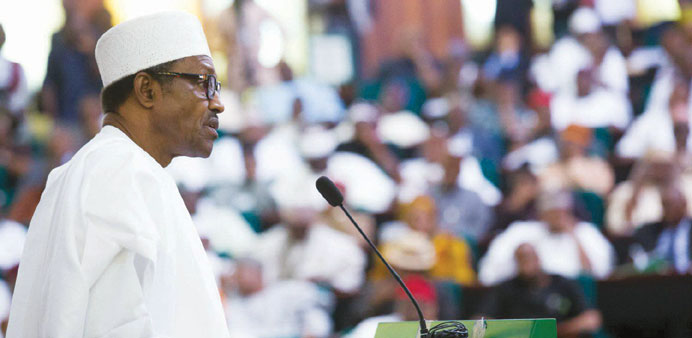Buhari delivers the 2016 budget at the National Assembly in Abuja on December 22: focus on infrastructure and social reforms.
By Stuart Graham and Sam Olukoya/Lagos/ DPA
Nigerian President Muhammadu Buhari made a range of election promises before he took office earlier this year.
In his election campaign, Buhari said that he would eliminate corruption and create 3mn jobs a year for his country of 177.5mn people.
He has also frequently vowed to wipe out terrorist militia Boko Haram.
But more than six months into his presidency, Buhari’s bid to overcome these major obstacles is appearing somewhat unrealistic.
Not only does Boko Haram continue to target the country’s north with rampant suicide bombings; the economy is sluggish due to a low oil price, leaving little funds for fighting terrorism.
The country, Africa’s largest in terms of Gross Domestic Product, relies on oil for around 90% of its foreign exchange earnings and 75% of its budget.
But the price of crude oil has plummeted this year from over around $100 to $37 a barrel, depleting the government’s revenue.
Nigeria has few long-term contracts with countries, with much of its oil sold on the spot. As sanctions on Iran are lifted and as the US increases its oil production, Nigeria has been finding it increasingly difficult to sell the product.
Organised oil theft also costs the Nigerian government billions of dollars each year.
Meanwhile, fraud, scams and political bribery pose massive hurdles for the new government. In 2015, the west African country ranked third-worst for corruption in a global barometer by non-governmental organisation Transparency International.
Buhari has referred to corruption as “the greatest form of human rights violation” and promises to be ruthless in rooting it out.
Risk analyst Malte Liewerscheidt says the newly-elected leader has been actively laying the ground work for 2016 by “plugging the leaks” in a corrupt economic system.
“It took President Buhari several months to name a cabinet after he came to office but when he did, he appointed people with strong anti-corruption credentials to run the main entities that generate revenue,” Liewerscheidt says.
He names the introduction of a single federation account as an example of Buhari’s bid to tackle backhand dealings. All government revenue is paid into this account, he says.
“It’s not highly visible for public, but it is crucial if you want to reform Nigeria.”
Buhari has recognised that Nigeria needs to diversify from oil and announced gargantuan infrastructure and social reforms with a 6tn Naira budget ($30.06bn) in 2016 - a 30% increase on the 2015 budget.
The budget, which Nigeria intends to fund by borrowing around 1.2tn Naira domestically and through foreign loans, will pour money into energy, road and rail infrastructure and the agriculture sector.
“The government has said it wants to revive its agriculture in order to be self-reliant at producing its own rice, tomatoes, wheat and maize,” Liewerscheidt says.
Economic analyst Waidi Gbenro is less convinced that Buhari will be able to raise funds to cover the cost of his infrastructure plans.
“The indicators are very bad. Nigeria’s external reserves are dwindling while the market for the oil we are producing is shrinking,” he said.
The only survival option for the government, says Gbenro, is to generate money from outside the oil sector.
Along with economic challenges, attacks by Boko Haram in the north have left Buhari’s government with a major and costly clean-up task.
The group, which was pushed out of much of the territory it conquered in northern Nigeria before Buhari came to power, has impoverished the region by displacing tens of thousands of people and destroying infrastructure.
The new government will have a difficult time in the short term financing the major programmes that it wants to roll out as well as reconstructing the north-east, “where Boko Haram is very wide and porous,” Gbenro says.
He believes it will be difficult for the Nigerian Army to police those territories permanently as Boko Haram has taken to using young girls, who are difficult to detect as attackers, to detonate suicide bombs at crowded places likes mosques and markets.
It may be some years before Buhari’s plans yield results. Diversifying the economy away from oil, rooting out corruption and knocking the wind out of Boko Haram is no mean set of tasks.
But if he succeeds, Gbneru says, he may put Nigeria on the path to becoming a major world economy.

